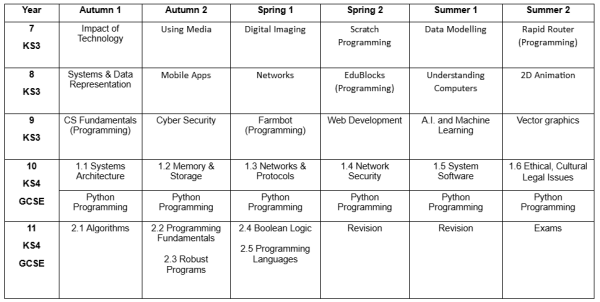Computing
Computing at Key Stage 3
The vision for computing is for students to develop a passion for technology and acquire the knowledge and skills they need to access all opportunities. The aim is to develop the computational thinking and problem-solving skills that are necessary for our students to meet the high demands of industry.
As well as this, students should gain essential IT skills such as word processing, data modelling and presenting so that they are able to access further education and employment opportunities.
These skills will be in demand in many non-technical fields and so it is essential the students have access to computing technology and both the confidence and opportunity to practise them.
The curriculum should also encourage students to practise e-safety and understand the risks involved from using the internet. Students should be well aware of the expectations of the computing classes and what it takes to be responsible and respectful users.
Computer Science at Key Stage 4
Computing is taught from Years 7 to 11. As such the curriculum attempts to lead the students in a logical progression so that by the time they reach GCSE level they are well prepared for the challenges they face. Also, if students elect not to continue after Year 9 then they have still received a well-rounded and complete Computing education.
In Years 10 and 11, we follow OCR’s GCSE (9–1) in Computer Science which consists of two compulsory components that are externally assessed.
Paper 1 - Computer systems
Paper 2 - Computational thinking, algorithms and programming
All students must be given the opportunity to undertake programming tasks during their course of study. The students are expected to use a high-level text-based programming language for this, enabling them to build upon their programming knowledge and skills developed throughout Key Stage 3.
We aspire to cultivate computational thinkers who, in line with our ‘Thriving through excellence’;
Possess AMBITION to achieve the best outcomes possible through critical thinking, problem-solving, and analytical abilities
Demonstrate PRIDE in accuracy, organisation, and precision of their work
Show RESPECT to others to learn and develop resilience, adaptive thinking and be respectful users

